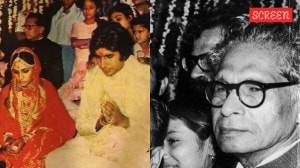Rahul Gandhi, the Leader of Opposition in Lok Sabha, mounted another attack on the Election Commission on Thursday (September 18), this time, over discrepancies in voter deletion applications in Karnataka’s Aland Assembly constituency in 2023. He accused Chief Election Commissioner Gyanesh Kumar of “protecting people who are destroying Indian democracy”.
The EC hit back, saying the allegations were “incorrect and baseless”. However, the commission admitted that “certain unsuccessful attempts were made for deletions in the Aland Assembly constituency” in 2023, but it added that “an FIR was filed by the authority of the ECI itself to investigate the matter.”

What exactly happened in Aland? Who can petition for names to be deleted from the electoral roll? We explain.
What Rahul Gandhi said about Aland today
Gandhi said there had been an attempt to wrongly delete over 6,000 names from the electoral rolls in Aland constituency in 2023, which was caught and an FIR lodged as well. He said the Karnataka Criminal Investigation Department (CID) had repeatedly asked the Election Commission for the destination IP addresses and One Time Password trails related to the online applications, but the EC had not provided the same.
“Aland is a constituency in Karnataka; 6,018 votes. Somebody tried to delete 6,018 votes. We don’t know the total number of votes that were deleted in Aland in the 2023 election. They’re likely much higher than 6,018,” Gandhi said.
“But somebody got caught deleting 6,018 votes, and it was caught, like most crimes, by coincidence. What happened was the booth-level officer noticed that her uncle’s vote was deleted. So, she checked who deleted her uncle’s vote and found it was a neighbor. However, neither the person deleting the vote nor the person whose vote was deleted knew; some other force hijacked the process and deleted the vote, and, as luck would have it, got caught,” he added.
Gandhi also alleged that the applications for deletion of names, specifically of Congress voters, were filed using a software, from outside Karnataka.
Story continues below this ad
When was the Aland matter raised before this?
In 2023, such allegations had indeed emerged in Aland. A voter had claimed that his sister, a Booth Level Officer (BLO), had received Form 7 applications to delete the names of several members of their family from the electoral roll, on the grounds that they had moved out, when they had not.
The Congress had then raised this issue, saying it would file complaints about Aland and other constituencies with the Election Commission.
According to the FIR lodged by the then-Assistant Electoral Registration Officer Mamatha Kumari on February 21, 2023, then-former Congress MLA of Aland, B.R. Patil, had lodged a complaint with the Election Commission about the wrongful deletion of 6,670 names from the electoral rolls. She said upon inquiry, it was found that deletion forms for 6,018 voters had been lodged from December 12, 2022, to February 2, 2023, through the EC’s apps. She said 24 deletion applications were found correct and went through, while in 5,994 cases, some malicious intent was suspected. The electors had not been informed that someone had filed objections to their names, and in some cases, the electors in whose names the objections were filed, claimed they had not done so. The FIR was lodged under sections of the Indian Penal Code including for cheating and forgery.
What is a BLO, and what is Form 7?
The EC too today referred to the irregularity found in Aland in 2023, but highlighted that it had filed the complaint in the case on its own. In its response, it said, “No Deletion of any vote can be done online by any member of the public, as misconceived by Rahul Gandhi. No deletion can take place without giving an opportunity of being heard to the affected person.”
Story continues below this ad
According to rules, BLOs can indeed make an application to delete a certain voter on grounds of death or shifting of residence. However, a round of verification is supposed to be carried out before deleting the voter.
A Booth Level Officer (BLO) is a generally a local government official, anganwadi worker, government schoolteacher, etc., who is a registered voter in a particular area and familiar with the area and its residents. Acting as the Election Commission’s local representative, the BLO helps in updating the electoral roll.
A 2018 manual of the Election Commission says, “The BLO will make frequent field visits to the villages in the said part and interact with local people particularly village elders and grass root level elected representatives and identify the names of the dead/shifted/duplicate voters in the roll…”
How are names deleted from the electoral roll?
As per Section 22, Representation of the People Act, 1950, electoral registration officers (EROs) of Parliamentary constituencies can make corrections and deletions to the electoral roll, either on applications made to them or on their own motion, after inquiry. EROs are usually sub-divisional magistrates or other state government officials.
Story continues below this ad
The ERO can delete an entry on the ground “that the person concerned is dead or has ceased to be ordinarily resident in the constituency or is otherwise not entitled to registered in that roll”. But, in each case, the ERO has to conduct an inquiry and give the elector sufficient time to respond.
Apart from the ERO, any elector registered in a particular constituency can object to a name included in a draft electoral roll and seek deletion. Rule 13 of the Registration of Electors Rule, 1960 says the objection has to be filed in Form 7. The objection has to be filed within 30 days of the draft roll being published.
And what is Form 7?
The Form 7 is the EC’s application form for “objection for proposed inclusion/deletion of name in existing roll”. In case an elector finds their name wrongly deleted, either they or the BLO can file the Form 7 for inclusion.
It is also used in case an elector of the constituency wants to object to a name included in the roll, seeking deletion in case the elector concerned has died or permanently shifted or already enrolled somewhere else or under age (18) or not an Indian citizen. The applicant has to sign a declaration that if their statement is found to be false, they can face one year imprisonment and/or a fine.
The BLO’s claims are then verified by a Field Level Verifying Officer.
Story continues below this ad
The Election Commission also states that in “case of deletion, notice is issued and an opportunity given to electors for filing an objection and hearing is given.”
Form 7 can be filled out either online or offline. In case of online application, the applicant has to register on the EC’s Voter Service portal using a phone number, on which an OTP is sent for verification.
After submitting the form, the ERO must follow the procedure prescribed in the rules, including giving a notice to the elector, conducting an inquiry and passing an order. The Booth Level Officer (BLO), who is an elector of that booth and a local government employee, such as a government school teacher or anganwadi worker, is supposed to conduct field visits.
In the case of Aland, Gandhi alleged that the phone numbers used to lodge the Forms 7 were from outside the state. In its response, the EC said, “No deletion of any vote can be done online by any member of the public, as misconceived by Rahul Gandhi. No deletion can take place without giving an opportunity of being heard to the affected person.”
Story continues below this ad
According to the rules, even after deletion in the final roll, electors have two appeals – first before the District Magistrate and second before the Chief Electoral Officer of the state.









































